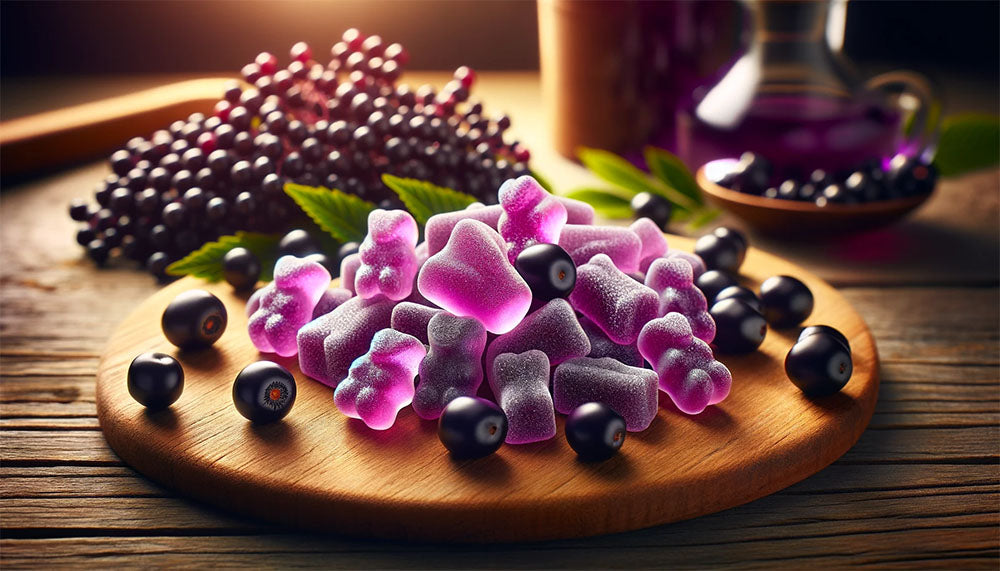When winter comes, we all know it's time for hot cocoa, thick sweaters, and unfortunately, colds and the flu. But did you know that elderberry can be your friend during this time? It’s like a superhero for your immune system, and it’s all natural. Let’s talk about how elderberry can help keep you healthy when it's cold outside.
What is Elderberry?

Elderberry refers to the dark purple berry from the elder tree, famous for its immune-boosting properties. Packed with nutrients, elderberry has been a go-to for natural health enthusiasts.
Elderberry's Immune System Benefits
Elderberry's reputation as a potent immune system booster is not unfounded. Its benefits for your body's defense system are numerous, supported by both traditional use and scientific studies. Here's a breakdown of how elderberries can be your immune system's ally:
-
Rich in Antioxidants: Elderberries are packed with antioxidants such as flavonoids and anthocyanins. These help to protect your cells by neutralizing harmful free radicals, which are unstable molecules that can damage cells and contribute to aging and diseases.
-
Vitamin Powerhouse: They are rich in vitamin C, an essential nutrient known to support the immune system. Additionally, elderberries provide a good dose of vitamin A, which is involved in regulating the immune system and maintaining the integrity of mucosal cells, which are part of the body’s first line of defense against pathogens.
-
Anti-Viral Properties: Studies have suggested that elderberry extract has anti-viral capabilities. It appears to inhibit the replication of viruses, which means it can potentially prevent them from spreading throughout your body.
-
Supports Inflammation Response: Elderberries have anti-inflammatory effects. Since inflammation can be the immune system's response to infection or injury, managing it effectively is part of staying healthy.
-
Relief from Cold and Flu Symptoms: There's evidence to suggest that elderberry can reduce the severity and duration of cold and flu symptoms. Taking elderberry extract within 48 hours of the onset of symptoms may help lessen the blow of a cold or flu and help you recover faster.
-
Sinus Infection Aid: Due to its anti-inflammatory and anti-viral properties, elderberry may help alleviate symptoms associated with sinus infections, which often become more common during the colder months.
-
Soothing for the Throat: Elderberry syrup is commonly used as a remedy for sore throats. Its anti-inflammatory properties can help reduce irritation and pain.
-
Supports Immune Response: While bolstering the immune system, elderberry can also moderate the immune response, potentially preventing an overreaction of the immune system, which is beneficial in inflammatory illnesses.
-
Respiratory Health: Elderberries have been traditionally used to support respiratory health, which is particularly beneficial during the winter months when respiratory conditions tend to increase.
In essence, the diverse immune benefits of elderberries make them an excellent supplement during the cold season when our bodies are particularly vulnerable to external pathogens. It's important to remember that while elderberry can be a powerful supplement, it should be part of a holistic approach to health that includes a balanced diet, regular exercise, and adequate sleep.
The Historical Use of Elderberries

Elderberries have been a part of traditional medicine for centuries, with their use recorded in various cultures around the world. This deep-seated history reflects the high regard ancient civilizations had for this fruit. Here's a closer look at the elderberry's journey through time:
-
Ancient Egypt: Elderberries were celebrated in ancient Egypt, often employed to improve complexion and heal burns. It's said that even the pharaohs indulged in elderberry-based preparations to maintain their skin health.
-
Native Americans: Different tribes across North America used elderberries for a wide array of medicinal purposes. They utilized the entire plant, from its flowers to the berries, to treat infections, relieve headaches, and reduce fever, among other uses.
-
European Folk Medicine: In Europe, elderberry was a staple in folk medicine. Referred to as the "medicine chest of the country people," the elder tree's various parts were used to treat a myriad of conditions including dental pain, heart pain, and as a diuretic.
-
Scientific Interest in the Middle Ages: The elder tree was subject to scientific interest during the Middle Ages. Hildegard von Bingen, a well-known herbalist of the time, praised the elderberry for its beneficial properties.
-
Renaissance Remedies: During the Renaissance, elderberry was commonly used in syrups and tinctures. It was believed to be effective against rheumatism and as a tonic to promote longevity and enhance well-being.
-
World War II: Elderberry syrup saw a resurgence during World War II, particularly in Britain. Due to food rationing, the government encouraged the cultivation of elder trees, and the berries were used to make syrups and preserves that were rich in vitamin C.
-
Modern-Day Research: Today, elderberry is the subject of many scientific studies that aim to understand its health benefits. While traditional uses have paved the way, modern research seeks to provide a clearer, evidence-based picture of how elderberries can contribute to health and wellness.
This rich history not only showcases elderberry's longstanding use but also underscores the need for continuous research into its potential as a natural remedy. The story of elderberries is one of nature's resilience and the human quest for health through the gifts of the earth.
Elderberry Supplements: Your Convenient Health Ally

Elderberry supplements have made it easier than ever to access the health benefits of this ancient berry. In today’s fast-paced world, maintaining a robust immune system is vital, and elderberry supplements offer a convenient solution. They come in various forms to suit different preferences and lifestyles:
-
Syrups: Traditionally used, elderberry syrup is a concentrated form of the berry's extract, often combined with other immune-boosting ingredients like zinc or vitamin C.
-
Gummies: For those who prefer a tasty treat, elderberry gummies are a popular choice. They provide a measured dose of elderberry’s goodness in a chewable form, making them a favorite for both adults and children alike.
-
Capsules: Capsules offer a no-frills, straightforward way to incorporate elderberry into your health regimen, perfect for those who are on the go and prefer a non-sweet option.
Our Elderberry Gummies stand out as a particularly appealing option. Not only do they contain the powerful extract of elderberries, but they are also crafted to include additional vitamins and minerals that support immune function. Here's why our gummies might be the right choice for you:
-
Taste and Convenience: They taste great and are easy to take. No water needed, just a quick chew, and you're on your way to better health.
-
Measured Dosage: Each gummy offers a precise amount of elderberry extract, ensuring you get just the right dose every time without the guesswork.
-
Additional Nutrients: Alongside elderberry, our gummies often include vitamin C, vitamin D, and zinc, creating a synergistic blend that amplifies your immune defense.
-
Quality and Purity: We take pride in the quality of our supplements. Our gummies are made with pure elderberry extract without any artificial colors or preservatives.
-
Accessibility: No matter where you are, you can easily carry a bottle of our gummies with you, ensuring you never miss a day of immune support.
The Significance of Elderberry in the Cold Season

The winter season brings with it a unique set of challenges for our immune system. Shorter days and less sunlight result in lower levels of vitamin D, a crucial element for immune defense. The cold weather also encourages people to spend more time indoors, often in close proximity to others, which can facilitate the spread of germs. This is where elderberry steps in as a valuable ally.
Elderberry's role in supporting the immune system is particularly significant during these cold months for several reasons:
-
Vitamin D Compensation: Elderberry can't replace the sun's role in our vitamin D production, but it does provide other immune-supportive nutrients, such as vitamin C and antioxidants, which help maintain the immune system's function when vitamin D levels may be low.
-
Respiratory Support: Elderberry has a history of being used for respiratory health. With colds and respiratory infections more common in winter, elderberry's potential to support the respiratory system is especially relevant.
-
Immune Modulation: The immune-modulating effects of elderberry mean it can help regulate the immune system's response. This is key in the cold season when the immune system might be prone to overreacting, leading to inflammation and increased susceptibility to infections.
-
Stress Reduction: Winter can be stressful with the holidays and the pressure of end-of-year deadlines. Stress negatively affects the immune system, but the regular consumption of elderberries may help mitigate this effect due to their nutritional content and potential to improve overall well-being.
-
Nutrient Dense: The dense nutritional profile of elderberries, including high levels of antioxidants, helps counteract the increase in oxidative stress that can come with colder weather, bolstering the body's natural defenses.
Choosing High-Quality Elderberry Products
With many options available, opt for elderberry products that prioritize purity and potency, free from unnecessary additives.
Try our Elderberry Gummies today.







Share and get 15% off!
Simply share this product on one of the following social networks and you will unlock 15% off!